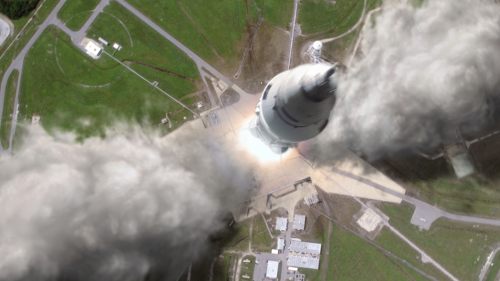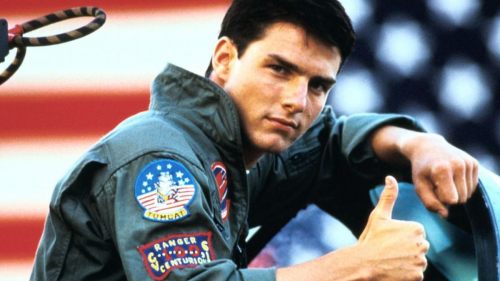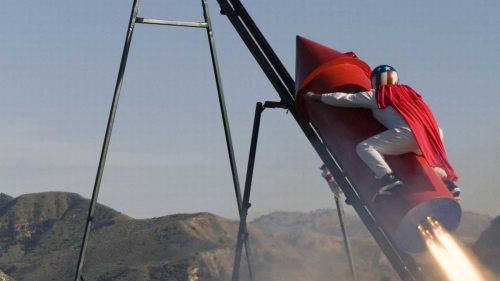My Architect: Christopher McQuarrie And Ten Years Of Tom Cruise Blockbusters
Mission: Impossible - Fallout is in theaters now. Get your tickets here!
Christopher McQuarrie won the Oscar for Best Original Screenplay with The Usual Suspects ('95) – the iconic, twisty, neo-noir that made everyone who watched it remember the name Keyser Söze, shot Kevin Spacey's career into the upper stratosphere, and helped Bryan Singer become a tentpole filmmaker. Today, Spacey and Singer are now Hollywood persona non grata thanks to a string of sex scandals, while McQuarrie has ascended to being one of the entertainment industry's busiest workmen. The starting point for this career climb? A Bryan Singer movie, where the hard-working scribe met Tom Cruise.
Valkyrie ('08) is the classy, old school adventure fictionalization of the plot to assassinate Hitler by a group of desperate renegade Nazi officers during WW II. Co-written with his former assistant, Nathan Alexander, McQuarrie tailored the part of eye-patched Colonel Claus von Stauffenberg for Cruise. At the time, McQuarrie had been crafting a re-write of the Logan's Run remake (also aimed for Singer to direct), when he was inspired by a 2002 tour of Berlin, which included a viewing of the Bendlerblock monument to the German resistance. Valkyrie was just one of many historical scripts McQuarrie was developing – including biopics on Abraham Lincoln shooter John Wilkes Booth and conqueror Alexander the Great – but the project became paramount to him after he introduced Singer to Cruise. Speaking with First Showing, McQuarrie described the meeting, which resulted in him also becoming a producer on the picture:
"I had taken Bryan to United Artists, introduced him to Tom and to [Cruise's producing partner] Paula [Wagner]. Bryan had met Tom previously but I had met Tom more recently. So I had sort of brought everybody together, packaged the movie and was ready to leave. Paula Wagner took me to lunch one afternoon and she said, 'We're going to make an announcement in the trades tomorrow that we're making this movie and that we have an actor.' And I said, 'A specific actor?' Because I couldn't believe what I thought she was implying, and she said, 'Yes,' meaning Tom. And she said, 'You're producing the movie, right?' Because she knew I was taking the producing credit."
Valkyrie couldn't have come at a better time for McQuarrie, who had been relegated to the dreaded, proverbial "director's jail", thanks to his still underrated debut, The Way of the Gun ('00). Rarely seen on terrestrial or subscription television, wasn't available on Netflix until somewhat recently, and certainly not the first film that comes to mind when you think of the now omnipresent writer/producer/director (though this author proudly owns his Artisan DVD from its Blockbuster Video days), Way of the Gun is a film that distinctly belongs to the tail end of the post-Pulp Fiction ('94) wave of smaller neo-noirs that overtook cinemas in the wake of The Usual Suspects’ critical and commercial success. Though he's still pleased with the picture, McQuarrie admitted to Empire (in a '13 chat) that he'd love to have another crack at it, utilizing all the skills he'd obtained in the subsequent years:
“The Way of the Gun I wrote in five days. It didn’t change very much. But I shot it in a very stark way and didn’t leave myself room to manipulate. I would never shoot a movie like that again. I would shoot for that: I like masters and I like when a scene plays out. But you have to be able to control the rhythm and the tempo of the movie.”
Valkyrie ended up making a modest mint worldwide ($200 million on a budget of $75 mil) and kicked off a creative partnership between Cruise and McQuarrie that would lead to the writer being called in as a behind the scenes "doctor" of sorts, midway through the production of Brad Bird's fourth Mission: Impossible picture, Ghost Protocol ('11). Continuing the wild adventures of IMF Agent Ethan Hunt (Cruise), animation maestro Bird's live-action debut is an IMAX spectacle – with over thirty minutes of set pieces (including the iconic Burj Khalifa scaling) shot in the large format – that required the burgeoning blockbuster fixer to do some major story tinkering behind the scenes:
“On Ghost Protocol I came in on the middle of the shoot to do a rewrite of the screenplay, though they had already started the movie. I had to communicate with the entire staff to determine what I could and couldn’t change, what sets had been built or struck, what scenes I could or couldn’t reshoot. I learned so much about production being right there.
The script had these fantastic sequences in it but there was a mystery in it that was very complicated. What I did was about clarity. The mystery had to be made simpler. It’s like reaching into a sock and pulling it inside out. It’s still a sock, still all the same pieces, but all put together in a different order.”
McQuarrie would act as a sort of big budget storytelling savior again on Cruise's action packed adaptation of Hiroshi Sakurazaka's All You Need Is Kill (which was sadly re-titled to Edge of Tomorrow ['14] for its cinematic iteration). The project had been in development for almost as long as the actor and McQuarrie were working together – with Brad Pitt originally slated to star – until Cruise signed on and Bourne Identity ('02) director Doug Liman quickly followed. Originally penned by Dante Harper, Liman threw out two-thirds of the original draft after entering the picture (after Mission: Impossible III ['06] co-writers Alex Kurtzman and Bob Orci also delivered a draft) and then hired Jez Butterworth and John-Henry Butterworth for re-write duties. Eight weeks before shooting was scheduled to commence, McQuarrie was called to re-tool All You Need Is Kill, as the screenplay was reportedly a complete disaster.
Just before Edge, McQuarrie had solidified himself in Cruise's filmic family by taking writing and directing duties on Jack Reacher ('12): one of the finest meat and potatoes studio action programmers that we've been gifted during the last decade. McQuarrie and Cruise's version of Lee Child's One Shot (which is actually the ninth book in the pulp paperback run) operates as the blue collar answer to Ethan Hunt. Cruise's Reacher – which, much like his Lestat in Neil Jordan’s Interview With A Vampire ('94) enraged purist fans of the novel due to his stature not lining up with the author's description – is an off-the-grid working stiff called in to solve the conspiracy behind a lone wolf sniper's kill crazy rampage. Showcasing razor sharp tough guy dialogue, a knack for place (as cinematographer Caleb Deschanel shoots the hell out of Pittsburgh), and brilliant character work beyond the titular military sleuth (such as Werner Herzog's ridiculously evil villain The Zec), Jack Reacher is the sort of modestly budgeted adult thriller we just don't get that many of anymore.
It's good to remember that, with the Mission: Impossible movies, Tom Cruise created his answer to James Bond in Ethan Hunt, and he hand-picked each director – from Brian De Palma to John Woo to JJ Abrams to Brad Bird – as individuals whose artistic visions he admired. When McQuarrie manned Jack Reacher, and was then brought in to work with Cruise/Liman, he was entering the superstar's self-minted secret society, which he kept tight knit by returning to the same collaborators over and over again. Just look at Cruise's re-teaming with Joseph Kosinski – who shot the critically and commercially disappointing sci-fi lark Oblivion ('13) – to make the long-in-the-works sequel Top Gun: Maverick ('19) for another solid example. It's a rotating roster, with whom the forever young idol keeps impeccable professional relationships because he genuinely believes in these folks and trusts their judgement, despite a flop or two*.
At the risk of recklessly playing laptop psychologist, it doesn't feel like a coincidence that Mission: Impossible III was released the year after Cruise's notorious couch jumping incident on Oprah Winfrey's daytime talk show forever changed how a good chunk of the general populous viewed him. When coupled with his increasingly public status as a leader in the Church of Scientology, suddenly the All-American marvel was viewed as "crazy Tom Cruise" by a solid subsection of movie-goers. If you count M: I III, between '06 – '18, Cruise would appear in fifteen films. Out of those, at least one of his Mission: Impossible kin played a role in nine, with the star continuing to work with repeat directors/screenwriters almost an equal amount of times (with Cruise almost always doubling as a producer). In short, the image-conscious actor had circled the wagons somewhat, and entering his creative clan was not an easy task. During that same epoch, Christopher McQuarrie worked with Tom Cruise seven times; the most out of any single collaborator. Along with JJ Abrams, McQuarrie became a primary architect of this filmographic stretch, helping to re-jigger how we saw Cruise onscreen.
Regardless of whether these team ups were motivated by any sort of personal self-preservation – as they could be just as easily explained by the fact that Cruise is incredibly particular with whom he chooses to collaborate – McQuarrie's Misssion: Impossible - Rogue Nation ('15) is a muscular, exciting piece of action filmmaking that takes the series to delirious new heights, while also introducing new characters – Rebecca Ferguson's British superwoman Ilsa Faust and Sean Harris' Blofeldian arch nemesis Solomon Lane – that almost steal the entire movie out from under Ethan Hunt. Yet for all spectacular action staging, McQuarrie also gets to sum the IMF agent up with a writerly speech (delivered by Alec Baldwin's CIA director Alan Humley) that is absolutely delicious, and reminds you that this artist will always have an ace author’s instincts at his disposal:
"Hunt is uniquely trained and highly motivated - a specialist without equal - immune to any countermeasures. There is no secret he cannot extract, no security he cannot breach, no person he cannot become. He has most likely anticipated this very conversation and is waiting to strike in whatever direction we move. Sir, Hunt is the living manifestation of destiny - and he has made you his mission."
As if unsatisfied with providing one high-water mark in franchise history, McQuarrie returns – marking him as the first director to ever helm two Mission: Impossible movies – to one up himself with Fallout ('18), which stands as one of the greatest action movies ever bankrolled by an American studio. It's a work of breathtaking ferocity and beautiful intimacy, as we watch Ethan's living manifestation of destiny finally have his moral reckoning (again at the hands of a near unstoppable Solomon Lane). Fallout is the apex of the Cruise/McQuarrie collaboration - proof that they've established a trust and artistic shorthand with one another that's possibly unmatched in the modern blockbuster arena. Together, they make remarkable pulp on a gigantic canvas most never get to paint on, and watching them grow over the last decade has been a true joy for film fans the world over.
*Though it'd perform better overseas, Edge of Tomorrow was a dud at the domestic box office. However, that didn't stop Cruise and Liman from reuniting to make last year's drug smuggling true crime caper, American Made ('17).
Mission: Impossible - Fallout is in theaters now. Get your tickets here!
This article is part of B.M.D. Guide To: MISSION: IMPOSSIBLE



